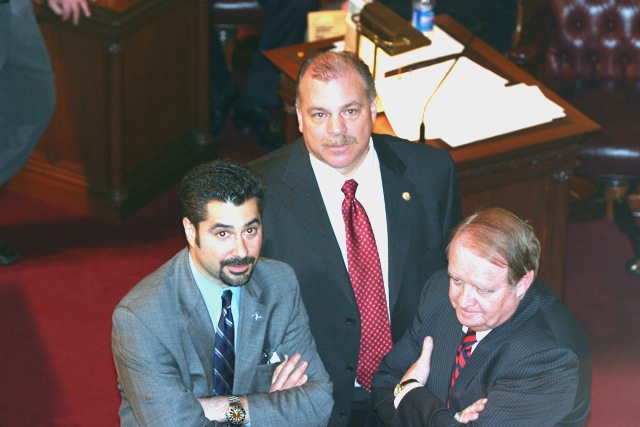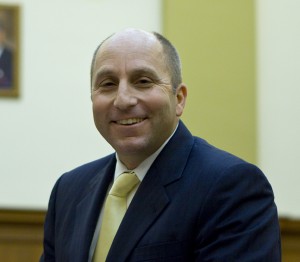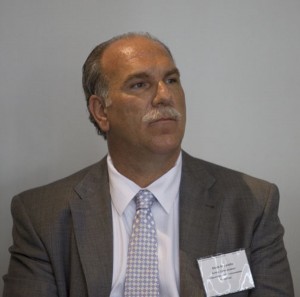Political Manipulation of Science – Jersey Style
The Bush administration was widely known – and denounced – for manipulation of science. Examples abound:
- The Union of Concerned Scientists issued a major report “Scientific Integrity in Policymaking – An Investigation into the Bush Administration’s Misuse of Science“,
- numerous examples were documented and criticized by major political figures, and
- entire books were written on the topic, like NY Times bestseller “The Republican War on Science“.
Perhaps the most visible and egregious example was Bush White House PR flacks rewriting EPA global warming reports and suppressing the work of Jim Hansen of NOAA, one of the world’s leading global warming scientists – so over the top, it got a CBS TV “60 Minutes” expose.
The NJ press corps press must think that such evil deeds occur only in Washington DC under a conservative Republican administration, because virtually the same thing goes on unreported right here in NJ under liberal democratic administrations.
NJ’s politicization of science is in some ways worse than the Bush administration’s.
The Bush people were at least smart enough to do their dirty work under cover and behind the scenes. They were implemented by low level and very expendable flacks. They required whistleblowers, or leaks, or investigative journalism to discover them.
But here in NJ, high level State officials – not flacks – act with impunity. They openly act brazenly and are stupid enough to put in writing exactly the same perverse Bush practices into formal DEP policy!
I have issued numerous press releases that document both the policies and specific examples of abuse (see links below), so the intrepid NJ press corps doesn’t even have to pick up the phone or crack a file over at DEP to document the abuses.
Let me repeat the text of these policies in one spot here:
1. Press Office Review and control over science
Under DEP regulations (NJAC 7:1-1 et seq; 37 NJR 3336), the DEP press office is the “single point of contact” with “all media“.
Scientists can not talk to media before clearance with the press office, including press office control over the content of what they say. A press office flack is in the room during any press interview or on the phone line to make sure the scientist tows the company line.
Under DEP regulations, the Press Office’s role is not to provide factual, objective, complete, responsive, and scientifically sound information. Instead, DEP regulations define the role of the press, which is to provide information that ensures “that all Department communications with the press reflect the current policies and priorities of the commissioner“.
Any communication with media or release of any science or fact that conflicts with the views of the Commissioner are verboten (DEP employeees have been fired for this). Information and science are spun as a matter of policy – could it be any clearer? See this link for details and all documents:
2. Policy Review and control over science
DEP has an internal review policy that governs public release of all science and data. The procedure requires:
- The material has undergone a seven-stage review process, including approval by DEP political appointees and press officers. The DEP Commissioner must also be notified in advance of any scientific report on an undefined “Hot Issue”;
- Even completed studies may not be “available for public distribution via print or online sources (i.e., journal and magazine articles)” until okayed by DEP management; and
- Technical updates of the “online Environmental Trends Report” will also require management sign-off including the personal approval of Ms. Herb.
DEP political appointees, the press office, the Commissioner, and perhaps the Governor’s Office must review and approve all science before it becomes public. We have documented cases where the science has been manipulated by these reviews. How could overt politicization of science get any worse?
3. Gag Orders on scientists
Stung by a string of embarrassing disclosures and breakdowns in toxic protections that prompted Legislative oversight hearings, the New Jersey Department of Environmental Protection ordered its employees to keep any “potentially sensitive information confidential” and to refrain from disclosing agency data to any outside parties”until it is ready for public distribution” according to an Agency email released by Public Employees for Environmental Responsibility (PEER).
4. Retaliation against whistleblowers or independent scientists
I was forced out of DEP as a whislelblower in 1995 for disclosing widespread mercury contamination of freshwater fish and a plan by Govneror Whitman to supress that science.
Since then, I’ve known of several retaliations by DEP managers.
DEP demoted and transferred its Chief Nuclear Engineer for raising concerns about industry influence on the Nuclear Regulatory Commission during the relicensing process for Oyster Creek nuclear plant, the oldest in the nation. According to a National Public Radio interview:
YOUNG: Ruch points to the case of whistleblower Dennis Zannoni. Zannoni was the agency’s top nuclear energy official. When he raised concerns about the safety of the Oyster Creek facility ”the oldest nuclear power plant in the country”he soon found himself off the nuclear beat.
ZANNONI: One day, January 30, 2007, I was removed without reason from my position as chief nuclear engineer and pretty much put in a broom closet in the department. And it’s been like that for two years. [link]
DEP retaliated against chemical engineer Zoe Kelman for writing and publicly releasing a dissenting report on the health risks of toxic chromium in Jersey City.
A comprehensive PEER survey of over 3,500 DEP employees found (read survey & responses here):
*More than half agree that “scientific evaluations are influenced by political considerations at DEP.”
*One quarter of employees reported that they have received direct orders “to ignore an environmental rule or regulation” during the past three years.
*Sixty percent of employees fear “job-related retaliation for disclosing improper activity within DEP.”
5. Secrecy and lack of Transparency
The conduct of science requires openess and tranparency. Yet DEP prohibits public release of scientific data and communications within the Department.
DEP claims that these data and communications are “deliberative” and exempt from public records laws.
DEP also meets with industry scientists in secret, and allows those industry scientists and lawyers and DEP political appointees to impact their scientific work and to eliminate findings and recommendations opposed by industry.
There is a wealth of documented abuse and manipulation of science. Yet, none of it has been reported by the anemic NJ press corps. The public – the victim of this fraud and abuse – is left in the dark by NJ media.
6. Scientific Fraud
Let me close by noting it has gotten so bad that even the Wall Street Journal – in December 23, 2005 page one story “Study Tied Pollutant to Cancer; Then Consultants Got Hold of It” – quoted a polluters’ consultant (you know, the guys that DEP takes “”at their word“) bragging that his scientific fraud had saved polluters “hundreds of millions of dollars” in NJ on reduced cleanup costs.
The fraudulent research was retracted by the journal that published it (but not the DEP regulatory standard that considered it). The people of NJ are paying for that fraud with our health and environmental integrity.
Read this letter to DEP Commissioner Jackson putting her on notice of this scientific fraud – Jackson ignored the science and this letter.
As my grandfather used to say – how about them apples?
Hey, maybe this is why Lisa Jackson eliminated the DEP Division of Science and Research and replaced it with a private external Science Advisory Board. More to follow on that soon.


